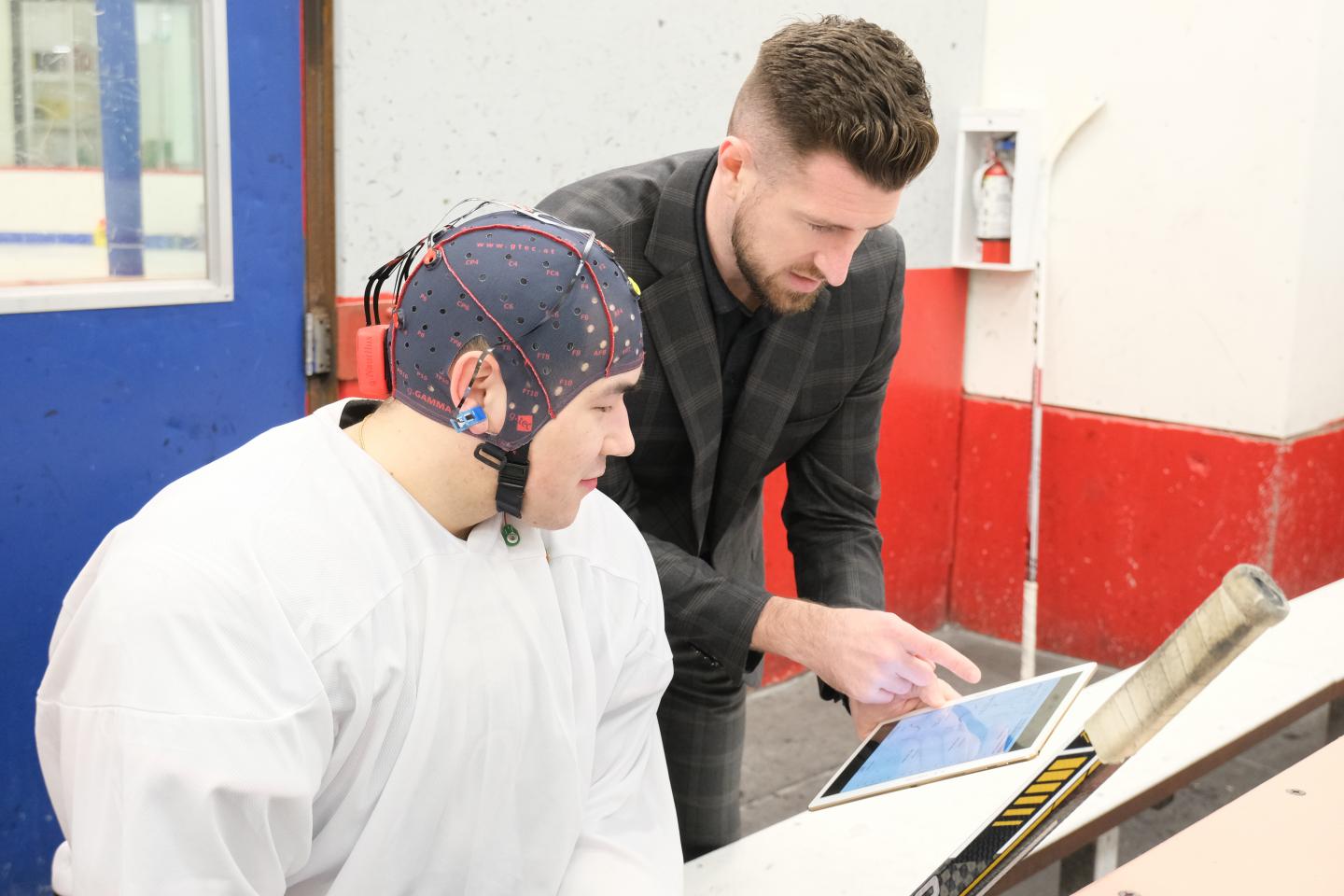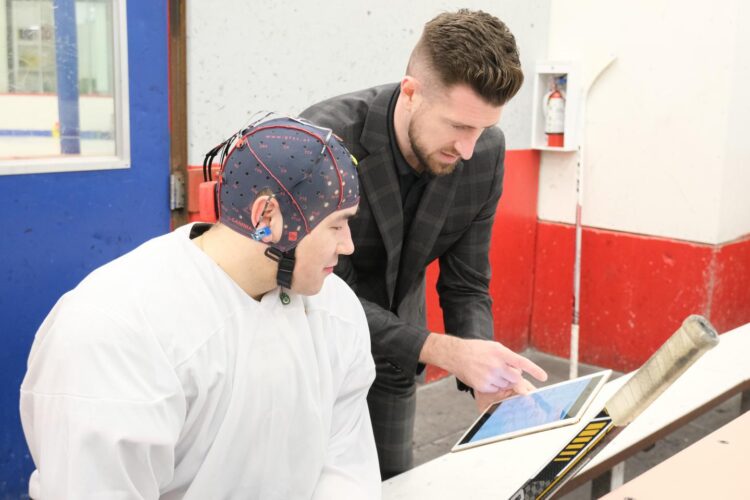Brain vital signs concussion study in Bantam and junior A ice-hockey detects significant subconcussive changes in cognitive brain function

Credit: Health and Technology District
Surrey, B.C. Canada and Rochester, Minn., U.S. (April 22, 2021) – Neuroscience researchers at Mayo Clinic Orthopedics and Sports Medicine in Rochester, Minnesota, U.S., the Health and Technology District and Simon Fraser University (SFU) in Surrey, British Columbia, Canada have published the latest results of their ongoing multi-year hockey concussion study examining changes in subconcussive cognitive brain function in male youth ice hockey players.
The research team monitored brain vital signs during pre- and post-season play in 23 Bantam (age 14 or under) and Junior A (age 16 to 20) male ice-hockey players in Rochester, Minnesota.
“Brain vital signs” translates complex brain waves measured using portable electroencephalography (EEG) at the rink-side, into simple, fast, user-friendly and intuitive results that provide an objective evaluation of cognitive brain function. Called the ABCs of brain function, brain vital signs track three well-established neural responses for Auditory sensation (using a response called the N100), Basic attention (using a response called the P300), and Cognitive processing (using a response called the N400).
The study builds on 2019 results published in Brain: A Journal of Neurology that confirmed significant brain vitals sign changes shortly after concussions were diagnosed in Junior A players. Key results of this study showed undetected impairments remained when players were cleared to return to play using current clinical concussion protocols. Notably, the initial study also reported sensitivity to subconcussive impairments in those players who did not sustain a concussion diagnosis over the course of the season.
The current second phase of the study replicated these results and added the Bantam age group. The latest findings were recently published in the peer-reviewed journal Brain Communications in the advanced articles section.
The results of this new Brain Communications study showed:
- Significant brain vital sign changes in N100 Auditory sensation and N400 Cognitive processing responses for the pre-to-post season comparison across both groups.
- Differences between the Bantam and Junior A ice hockey players showed more changes in the Junior A group.
- Importantly, the subconcussive changes were significantly correlated with the number of head impacts over the season across both age groups and consequently showed more subconcussive changes in brain vital signs.
A subconcussive impact is a mechanical force transmitted to the brain below the threshold for a diagnosis of an acute concussive injury. The effects of these low-magnitude impacts may not even be noticeable to the player or to observers on the sideline. Head impacts in the sport of ice hockey typically result from player-to-player or player-to-boards contact due to body checking, collisions and fighting . Some of these impacts are the consequence of foul play, but many of these events also result from routine, legal on-ice behavior.
“Concussion in sports is a major concern for many and our research has shown that having an objective physiological measure of brain function at rink-side is key to detection and managing concussive impacts,” says Dr. Aynsley Smith, principal investigator of the study and Associate Professor of Orthopedics at Mayo Clinic in Rochester, Minnesota.
The study, funded in part by USA Hockey, was co-led by Dr. Michael Stuart, Professor of Orthopedics at Mayo Clinic in Rochester, Minnesota. It is also part of a larger concussion research team within Mayo Clinic that includes neurology research leadership from Dr. David Dodick, Professor of Neurology at Mayo Clinic in Phoenix, Arizona, U.S.
Canadian collaborators include neuroscientist Dr. Ryan D’Arcy, an SFU professor and co-founder of the Health and Technology District in Surrey B.C. and Dr. Shaun Fickling, a biomedical engineer, a recent SFU PhD graduate and lead author of the study.
“Our research has shown that repetitive subconcussive impacts triggered compounding effects in brain function changes, which underscores the importance of shifting our thinking and understanding of concussions as a singular acute-injury model to a spectrum of head-impact exposure and effects over time,” says Dr. Fickling.
The US-Canadian concussion research team is continuing to advance their collaborative effort.
Says Dr. D’Arcy, “In medicine: you can’t treat what you can’t measure. With breakthroughs on measurement challenges, we hope to now accelerate treatment innovations for prevention, acute care and extended care concussion management – for all people across a range of different applications. Our partnership is moving into incredibly exciting future steps – stay tuned.”
###
The research study was designed and carried out by the Mayo Clinic Sports Medicine Ice Hockey Research team, partially funded by USA Hockey Foundation and the Johannson-Gund Endowment. Financial support was also provided by the Mathematics of Information Technology and Complex Systems (MITACS), Natural Sciences and Engineering Council Canada (NSERC) and the Canadian Institutes for Health Research (CIHR).
About Mayo Clinic:
Mayo Clinic is a nonprofit organization committed to innovation in clinical practice, education and research, and providing compassion, expertise and answers to everyone who needs healing. Visit the Mayo Clinic News Network for additional Mayo Clinic news. For information on COVID-19, including Mayo Clinic’s Coronavirus Map tracking tool, which has 14-day forecasting on COVID-19 trends, visit the Mayo Clinic COVID-19 Resource Center.
About Simon Fraser University (SFU):
As Canada’s engaged university, SFU works with communities, organizations and partners to create, share and embrace knowledge that improves life and generates real change. We deliver a world-class education with lifelong value that shapes change-makers, visionaries and problem-solvers. We connect research and innovation to entrepreneurship and industry to deliver sustainable, relevant solutions to today’s problems. With campuses in British Columbia’s three largest cities–Vancouver, Burnaby and Surrey–SFU has eight faculties that deliver 193 undergraduate degree programs and 127 graduate degree programs to more than 37,000 students. The university now boasts more than 165,000 alumni residing in 143 countries. http://www.
About Health and Technology District:
The Health and Technology District in Surrey, B.C., is a rapidly expanding ecosystem of innovators and entrepreneurs collaborating with tech companies, scientists, educators and health professionals; each representing a range of business, technologies and research fields. The series of high-tech buildings located and under expansion strategically across from Surrey Memorial Hospital, offers a dynamic community where disruptive impacts are generated through the translation of research, science and technology into global innovations. Within this, the current research is a result of the BrainNET initiative to translate neuroscience knowledge directly into clinical advances in care. http://www.
Media contact: Yvonne Chiang, [email protected]
Media Contact
Yvonne Chiang
[email protected]
Original Source
https:/
Related Journal Article
http://dx.





